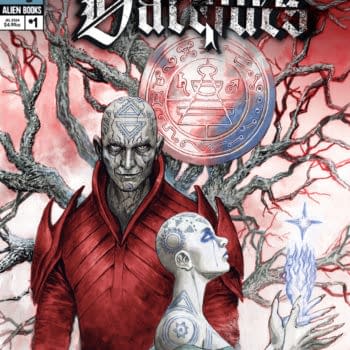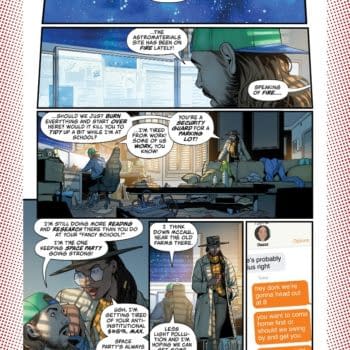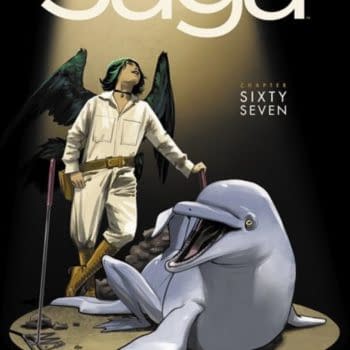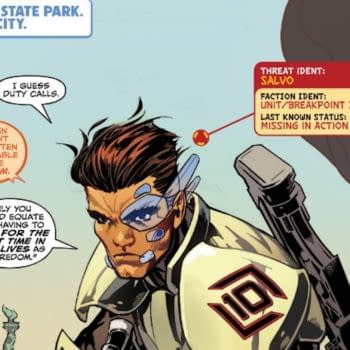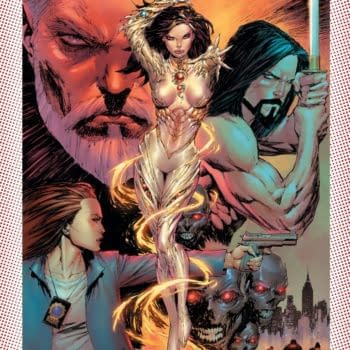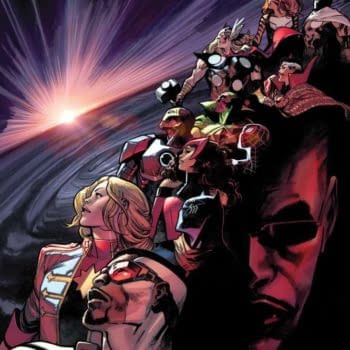Posted in: Comics, Recent Updates | Tagged: Christina Blanch, Comics, daredevil, education, entertainment, MOOC, scalped, social issues in comics, swamp thing
It's Time To Study Social Issues Through Comics – The Bleeding Cool Interview With Christina Blanch
Massive Open Online Comics Courses: the wave of the future? When pioneered by Christina Blanch, a doctoral candidate in Anthropology at Ball State University, the first course was so astonishingly successful that it surprised even Blanch. The first course's topic in 2013, "Gender Through Comics", brought in a number of comics pros to speak about their perspective on the medium, and the new course "Social Issues Through Comic Books" will also draw in a number of creators to take part in talking about a variety of topics, including "social inequality, the environment, government intervention, addiction, and information privacy". Both the earlier course and the current one are entirely free of tuition, though students must access the required texts themselves.

Bleeding Cool spoke with instructor Christina Blanch about this zeitgeist-tapping move toward MOOCs for comics and her experiences so far:
Hannah Means-Shannon: What inspired you to set up the first of your Super MOOC courses, "Gender Through Comics"? Was it a long road to make it happen?
Christina Blanch: Actually, "Gender through Comic Books" was a face to face course before it was a MOOC. I created a Gender and Comics course for a class assignment taught at the university and was asked if I would lecture to the class. One thing led to another, and the Women and Gender Studies Department asked if I would teach the course. After the course was underway, the iLearn group at Ball State approached me and asked if I wanted to teach the course as a MOOC. I jumped at the chance for several reasons. One, I love teaching, especially when I am using comics. Two, I am a big believer in life-long learning and MOOCs totally support that idea. And three, I wanted to be able to create an online class that was not an ordinary course. Once the process began, it took about 6 months before the class was up and running. There was a lot of preparation because it was not only my first time teaching a MOOC, but Ball State's first time offering one.

CB: I was really surprised at the amount of participation. I had read what to expect of students enrolled in MOOCs and I figured maybe 500 students (of 7200) would post something. We had about 3000 students that responded in the "introduce yourself" post. It was crazy! But a wonderful kind of crazy. The modules would go up on Sunday night at midnight and I would see people onTtwitter that were waiting anxiously for the new module to open. I loved it, but I always work up to the last minute, so it put pressure on me. I was still learning best practices for MOOCs so I left some parts very loose in case something in the previous module didn't work. I basically was in front of my computer for six weeks.
I was a little worried when this course began. I figured we would have trolls on the discussion boards. However, we had none, so that was a relief. The students were the best students ever – engaged, intelligent, helpful, congenial – just incredible. And they worked hard and they didn't have to be there. They were there to learn. When I suggested that we drop the quizzes, as there were no grades involved, the students all requested we keep them. I never thought I would see that!
One of the reasons that this course is six months long is because a lot of people commented that they felt they had to rush through the modules. They were only a week long in the gender course, and in the exit survey a lot of people mentioned they would like more time.

CB: I wanted to pick a broad topic that a lot of people could connect with. There are a lot of other MOOCs I want to teach using comics – animal representation, more gender courses, disability, race and ethnicity, comics and culture, history of comics – the list goes on and on. I just felt that this was an important topic and it seemed right to me. What's interesting is as I was doing another interview, it hit me about how important these topics are to discuss. There was the recent debate about the Coca-Cola commercial during the Superbowl which hits on immigration. There was the death of the beloved actor Philip Seymour Hoffman that is all about addiction. The recent weather and the questioning of global warming fits with the topic of environment.

CB: Comics are one of the most engaging teaching tools that I have used to teach. I have noticed a vast difference in my students since I started using comics as pedagogy. I always tried to engage my students by using popular culture, but there's something about comics – whether it's the unexpected, the interaction of words and pictures and what it does with the brain, the uniqueness of the form – I don't know. But the students are engaged and learn and remember. If the students learn, it's a good method. I have already seen more and more courses that use comic books pop up in academia just over the last few years. I hope that this trend continues and eventually evolves into universities having departments of Comic Studies.
I think life-long learning is so important. I mean, people go to college for 4 or more years, and then they are just done learning? You can read a book and learn obviously, but it's missing the component of discussion and interaction. Yes, you can take continuing education courses and those are really important but for many people, when 'real' life starts and you have a spouse, a job or kids or whatever, not everyone has the money or the time to take courses. This is a great alternative. You can spend as much or as little time on the course and since they are free it allows you to explore. Maybe there was a topic in college that intrigued you but you just couldn't fit more of those courses in your schedule. MOOCs allow you to continue the fascination on your own time.

CB: Remember that comics are a product of their time. The authors and artists, whether they realize it or not, are affected by what is happening around them in their culture. And also realize that everyone has different opinions due to their culture growing up. Just because you are from Indiana doesn't mean that you have the same opinions as other Hoosiers. Everyone has had different experiences and sees the world differently. The more we listen and discuss these social issues with each other, the more understanding we will have. And doing so through comics seems to take some of the pressure away.
HMS: What tips do you have for those hoping to set up comics discussion groups or courses on comics in their community?
CB: We're not asking a whole lot from our comic book shop partners. All we ask is for those shops to carry the books and to host one event a month where customers who are taking the course can gather and discuss the comics and the topics. We want to build a comics community. I think that shops should not only carry the books for the course, many of them are evergreen comics, but also have some other comics on hand similar to the topics we are discussing. Some people want to try new comics, but just aren't sure and feel odd venturing out into unknown territory. This is a great time for shop owners to help those looking to branch out to do so.
If shops want to be involved, all they have to do is email me and we'll add them to the list on supermooc.org. Then students can look on the site to see if there is a participating store in the area. Some groups I have talked to aren't even in comic stores – they are just groups of people who love comics and have created a group. In the first MOOC, we had so many groups form it was amazing! I hope that this can help people who love comics find each other and create a safe environment for people to talk about comics without getting stepped on.

CB: At our shop, Alter Ego Comics, we have an education section. There are staples like Maus and Persepolis, but also comics like The Judas Coin by Walter Simonson and comics that aren't necessarily thought of as 'education.' We also are hosting nights for educators. For example, when the recent PBS documentary aired, we invited educators to our store to watch it and have a discussion. Our next step is to provide lesson plans for certain comics that we have in the store that teachers can simply pick up and put to use. So many educators want to use comics but simply just don't know where to start. Comic shops can help them to find comics they can use in their classroom.
HMS: Do you have any favorite moments so far in teaching about comics?
CB: All of them. I get to read and teach about comics for my job. It's awesome! Actually I think my favorite moment is when an educator who took my Gender MOOC and who had never read a comic before, told me that he is using comics in his teaching now. There are a lot of stories like that, but this one really hit me because he had no intention of ever reading a comic much less using one to teach, and now he is such a believer.
For those interested in signing up, here's the course description:
Are you a life long learner? Do you like comic books? Do you think it would be interesting to discuss social issues using comic books as a lens? Are you an educator looking for different methods to present your material? If so, this course is for you! From the creator of Gender Through Comic Books (aka the SuperMOOC), this six month course will examine current social issues through comic books while understanding how popular culture is shaped by it's surroundings.
We will read a variety of comic books including Scalped, Daredevil, Swamp Thing, and many more. While reading these books we will examine topics such as social inequality, the environment, government intervention, addiction, and information privacy. Using lectures, live interviews with academics and comic book professionals, discussion boards, and readings, we will learn about social issues and how they are presented in comic books and the impact that those books have had on the issues whether large or small scale. This will be more than a class – it's a formation of a community.











